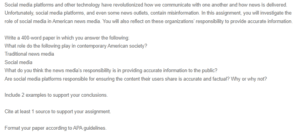Issues and Ethics in News and Social Media
Knowledge is power. In this context, the news and social media play a critical role in informing the public. Consequently, the media influences people’s perceptions on many issues as they rely on the news and social media to learn about events and issues like politics and health. Also, the media can affect policy formation and increase public demand for government action on certain matters. However, the media faces a challenge of misinformation, disinformation, rumors, and mal-information. This challenge poses a severe threat to public interests and is often linked to detrimental effects. For instance, misinterpretations regarding health information often hurt people’s mental health, accelerate vaccine hesitancy, and delay healthcare provision (World Health Organization, 2022). Therefore, it is important to investigate the role of the media in society and identify the responsibilities of the news media and social media platforms in ensuring the accuracy of conveyed information.
The Role of Media in Contemporary American Society
Both forms of media, traditional and social media, play a significant role in informing and entertaining the public. Nonetheless, it is important to note that these functions have evolved over the years. In the past, the public largely relied on traditional media for information. Also, the media outlets and other traditional media institutions determined what pieces of information were newsworthy and thus impacted people’s perception of what is important (Roberts, 2016). Today, in the social media era, the audience has become the message creator. Social media users play a more active role in determining what issues are important, issues that are even covered in the news (Roberts, 2016). Additionally, social media provides society with new ways to connect and serves as an outlet for self-expression. For instance, people who are geographically far from each other can communicate, make plans, or hold meetings through video calls. Also, through the various social media platforms, one can express themselves by posting or sharing their thoughts on a particular issue. Overall, social media has profoundly changed how people initiate, build, and maintain relationships.
The News Media’s Responsibility in Providing Accurate Information
The responsibility of news media in providing accurate information lies in fair representation of issues. To begin with, fair representation of issues implies pursuing the fullest version of the truth and diligently verifying facts to ensure that reported stories are accurate and in the correct context. Also, fair presentation means the news media should not favor any organization, political group, agenda, or ideology. Instead, news media should present all sides of an issue, avoid inflating stories, and be transparent about their sources of information so that the audience can, if in need, conduct independent research on the issue (University of Minnesota, 2016).
The Responsibility of Social Media Platforms Regarding Content Accuracy
Besides being outlets for self-expression and technologies through which one can publish and share content, social media platforms have now evolved as curators of content. As such, these platforms are responsible for ensuring the content their users share is factual and accurate. In addition, social media platforms are responsible for the accuracy of the content their users share because these platforms significantly influence individuals’ decisions about important matters, including health and politics. This role is exemplified in Pinterest’s decision to disable vaccine-related search results and limit results to posts from authoritative sources after facing criticism for the spread of misinformation regarding the efficacy and side effects of vaccines (Hirsh, 2019). In this regard, social networks should take sufficient action to eliminate disinformation in their spaces, which would, in turn, eliminate the effects of misleading information.
References
Hirsh, J. (2019, September 12). Why social platforms are taking some responsibility for content. Centre for International Governance Innovation. https://www.cigionline.org/articles/why-social-platforms-are-taking-some-responsibility-content/
Roberts, J. (2016). The role of media in American society. Pressbooks. https://ohiostate.pressbooks.pub/stratcommwriting/chapter/the-role-of-media/
University of Minnesota. (2016, March 22). 14.3 News Media and Ethics. Pressbooks. https://open.lib.umn.edu/mediaandculture/chapter/14-3-news-media-and-ethics/
World Health Organization. (2022, September 1). Infodemics and misinformation negatively affect people’s health behaviours, new WHO review finds. Bulletin of the World Health Organization. https://www.who.int/europe/news/item/01-09-2022-infodemics-and-misinformation-negatively-affect-people-s-health-behaviours–new-who-review-finds
ORDER A PLAGIARISM-FREE PAPER HERE
We’ll write everything from scratch
Question

Issues and Ethics in News and Social Media
Social media platforms and other technology have revolutionized how we communicate with one another and how news is delivered. Unfortunately, social media platforms, and even some news outlets, contain misinformation. In this assignment, you will investigate the role of social media in American news media. You will also reflect on these organizations’ responsibility to provide accurate information.
Write a 400-word paper in which you answer the following:
What role do the following play in contemporary American society?
Traditional news media
Social media
What do you think the news media’s responsibility is in providing accurate information to the public?
Are social media platforms responsible for ensuring the content their users share is accurate and factual? Why or why not?
Include 2 examples to support your conclusions.
Cite at least 1 source to support your assignment.
Format your paper according to APA guidelines.

